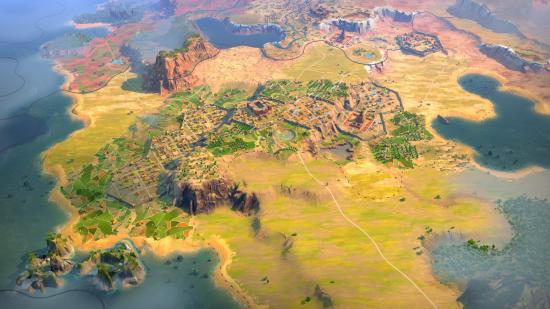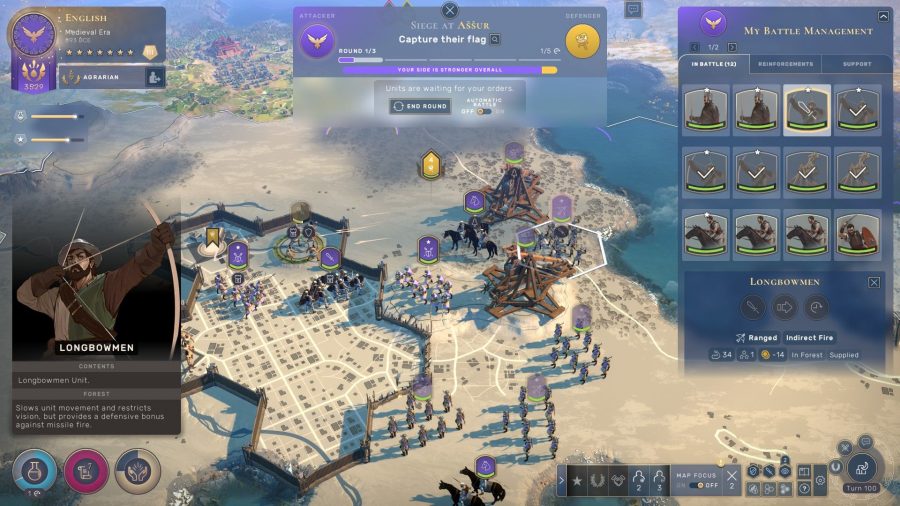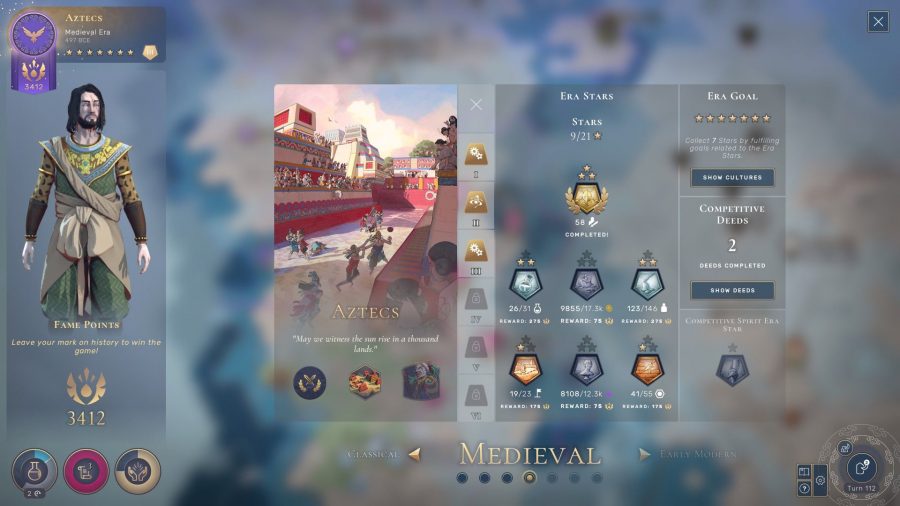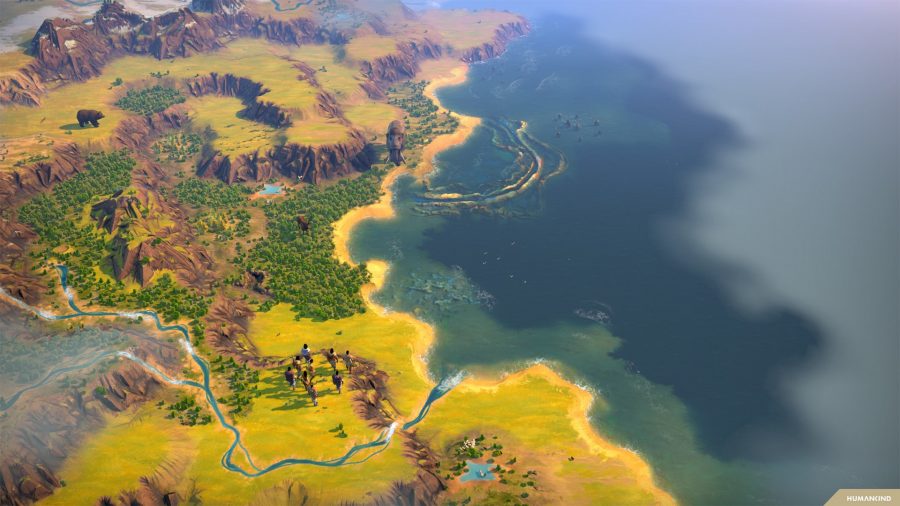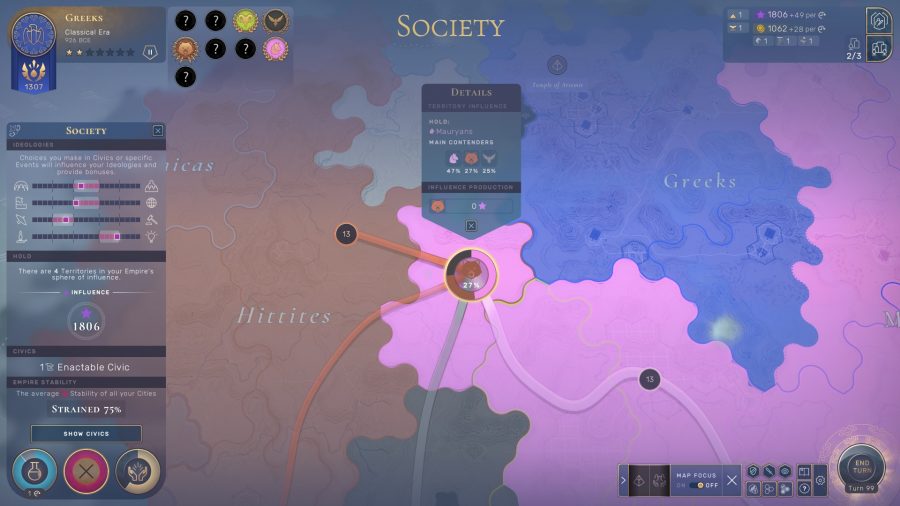It took a bit longer than expected, but Humankind is finally here. Amplitude and Sega’s new 4X game wants Civilization’s crown, and they’re making a serious attempt at ousting Firaxis from its throne – which you can read about in our Humankind review.
Having made a historical strategy game designed to challenge Firaxis’s titan, Amplitude naturally wants to try and attract Civilization fans. There are a lot of similarities between Civ and Humankind, but also plenty of key differences as well that may confuse, upset, or otherwise give pause for thought if you’ve just wrapped up a game of Civ VI and have decided to take Humankind for a spin.
We’re not going to get into the deep dark niche corners of, say, how Humankind approaches linking cities up by rail, or that ‘worker’ units aren’t really a thing. And we definitely don’t want to talk about sea crossings right now. But we have compiled a list of six key differences every Civilization fan should know about Humankind. Try not to be alarmed by all the tooltips.
One civ, many cultures
One of Civilization’s most interesting and potent choices is the one you make right at the beginning when you decide which civilisation you want to play. This has a profound effect on your entire run, as each civ has different strengths and weaknesses which will guide your playstyle.
Related: Humankind cultures guide
In Humankind, you make that choice every time you advance to a new era. There’s no pre-game choice – you start in the neolithic age as an anonymous nomadic tribe – but as you progress you are presented with a choice of ten cultures per era from which to pick. These are offered on a first-come, first-served basis, so if you delay, don’t be surprised if the AI has nabbed your favourite.
These cultures are themed around prominent societies and states from their era, and each is attached to one of the game’s seven affinities. Much like in Civilization, cultures in Humankind come with unique units, districts, and traits, the latter of which are retained as you go through the eras to define your civilisation’s particular abilities and identity. If you wish, you choose not to change culture when progressing to a new era, and instead ‘transcend’ your current one. You’ll win some bonus fame (see below) if you do this, but will not gain any new uniques.
Full-spectrum warfare
One debate that crops up every now and then among Civ fans is whether you prefer the doomstacks from Civ IV and earlier, or the one-unit-per-hex approach adopted by Civ V. Civilization VI is sort of in the middle, with some limited stacking, but Humankind offers the best of both worlds.
Individual units can stack together in an army, which has a unit cap that can be improved via techs, civics, and even culture traits. These armies move about the map as one entity, but whenever a battle occurs, individual units will unstack and spread across the local terrain, which becomes a tactical battle map determined by where the battle is taking place.
Related: A guide to Humankind war and combat
Paying attention to your environment is key – try to start fights when your army is on high ground. Once the battle is over, the units reform into the original stack (assuming any survive). Battles can last across multiple turns, as each turn on the campaign map only processes three battle rounds.
Humankind’s tactical battles take a lot of cues from one of Amplitude’s earlier 4X games, Endless Legend, and should not be ignored. You can auto-resolve them if you want, but doing so tends to produce worse results than if you fight them – and ignoring Humankind’s combat means ignoring one of its best features. Civilization fans in particular should give it a shot to see what a difference it can make to the flow of a game.
It’s not about finishing, it’s about winning
In Civilization, the way a game could end (outside of the turn-limit condition) was tied to one of a handful of specific victory conditions. If you were playing a scientific powerhouse, you’d likely be shooting for the scientific victory, which generally required you to research several late-game technologies so as to send a mission to Alpha Centauri (or Mars, in Civ VI’s less ambitious vanilla version).
Humankind separates how games end and how you win. As you’ll see from our Humankind victory guide, there are up to seven different ways a game can be declared ‘over’, depending on which options you select during game setup. But just because you manage to end a game doesn’t mean you’re going to win it.
The winner is the civilisation with the highest fame score. You’ll earn fame throughout the game and it can never be lost. There are many ways in which you can do so, but one of the primary means is by earning era stars. These ‘achievements’, of sorts, are also the means by which you progress from one era to the next, so you’ll want to pay close attention to them. Other sources of fame include winning wars, accomplishing world deeds, and building wonders.
Neolithic
You’ve probably heard plenty about Humankind’s Neolithic era by now. You start as an anonymous nomadic tribe, fresh from the Ice Age, and you’ve got to spend a few turns as a pre-agricultural society before you lay down roots and claim your first culture. Civilization, of course, is very different – if you’re not founding your capital city within the first couple of turns, you’re putting yourself at a major disadvantage.
In Humankind, you’ve first got to collect at least one era star before you’re even allowed to found your first city. Unlike future eras there are only three stars to aim for here, awarded for growing your tribe’s population by finding food; for seeking out ‘curiosities’ on the map, which award a drop of science and influence; or for hunting down animals.
You can still claim territory in the Neolithic era by putting down outposts, but you’ll need to find additional influence if you want to claim more than one, and you can’t convert that outpost into your first city until you’ve reached the Ancient era. The key takeaway for Civ players is to perhaps resist the urge to settle or even claim territory as soon as possible, and really go exploring to find the best site for your new civilisation. There are other advantages to remaining in the Neolithic era for a short while, as your nomadic tribe can grow quite quickly by foraging and hunting.
The only danger is that, the longer you wait, the less likely you are to be able to pick the Ancient era civ you actually want. And if you wait too long, your neighbours will outpace you in every way. The potential trade-off in terms of starting units, influence for claiming territories, and even an initial science boost, might make up for it though.
Culture shock
This is more of a semantic point, but Humankind doesn’t have culture. What it has instead is influence, a multi-faceted resource that moonlights as a currency, a cumulative condition for one set of era stars, and for exerting pressure on neighbouring territories in the same way culture does in Civilization games. Think of it as a measure of your civilisation’s soft power – a combination of artistic achievement, diplomatic clout, international reputation, and so on.
Producing influence is a relatively simple affair, but you’ll find there are a lot of ways to spend it, particularly in the early game. Influence is key to claiming new territory, founding new cities, attaching claimed territory to cities so that it can be properly exploited, implementing new civics policies, and even claiming new cultural wonders to build. It’s also important for influencing independent peoples – Humankind’s take on neutral city-states – and understanding what a ‘sphere of influence’ is, and its importance in the realm of international diplomacy, is key. Luckily, we have a handy Humankind influence guide to help you out.
Avatars
Something entirely new for Civ fans, Humankind’s avatar system is pretty neat, and it offers you a way to ultimately prove to the world how badass you are. Not only can you customise your own personal avatar with a wide array of cosmetics, like in many RPGs these days, but you can actually share it with the world for other players to use as an AI-controlled opponent in their games. You can apply specific ‘traits’ to it to define how it’ll play – these can be behavioural traits, like treachery vs loyalty, as well as gameplay perks such as bonuses to certain yields.
How often will it be used as an AI, you ask? Well, pretty often, it seems. Check out our AI persona guide for more details, but essentially if you connect your game with a Games2Gether account (Amplitude’s bespoke platform), you can upload your avatar to the internet and let it loose on the world. It’s worth noting that many AI traits need to be unlocked first via trophies, so you won’t be able to access all the fun ones straight away.
 Buy now Humankind Turn BasedStrategyBuy now
Buy now Humankind Turn BasedStrategyBuy now
Humankind is out now on PC via Steam, the Epic Games Store, Google Stadia, and is even available via Game Pass for PC.
